Blog post -
How easy is it to have your car repaired?
To comply with social distancing regulations many car service shops has closed their behind the counter customer service and waiting rooms to minimize contact between customers and staff.
The COVID-19 outbreak has led to an increased concern about hygiene to prevent the spread of the virus. The new normal forces car service shops to complete upgrades of their service concept under strict guidelines limiting face-to-face contact and banning-in person payment on the counter.
Convenience and the ease of car ownership
Many car service shops already have extended hours and loaner vehicles to make it as easy as possible for customers to get their vehicle serviced. The customer perspective is all about “how does the interaction make me feel?” and this emotion area is far and away the lowest rated component of customer experience in general.
- Car service shops can spend all the money in the world in every kind of media possible and never approach the value of a recommendation by a happy customer. The best way to get that is by consistent service that goes a step beyond what’s expected by the customer.
Why is this important? Because emotional engagement is a major driver of customer loyalty and advocacy for any business. It’s clear that invisible service — friction less customer service driven by digital — is something that’s desired. Comfortable. Fast. Invisible. We all want the same in our service experience — service with a swipe — making the inconvenient, convenient.
- Limited-contact service appointments
- Pull up outside of the service shop
- Drop of your key in a Sharebox outside
- Your vehicle is serviced as agreed
- Electronic invoice and mobile payment
- Pick up your key from the Sharebox
- Welcome back next time

Common pain points in the current service process include appointment making (which can require numerous phone calls), vehicle drop-off and pickup (waiting times at arrival often exceed ten minutes), and a lack of transparency regarding service completion status, cost & final payment including pickup availability only within opening hours.
Social distancing regulations
The challenges facing the car service sector are significant and complex, but they share something in common: they’re driven by rapidly changing social distancing regulations. In the end, real competitive advantage comes from truly understanding customers — and adjusting innovation, customer experience and business strategy based on the new normal. The world is collectively trying to manage a health crisis, and families and businesses are suffering. Quality customer service has never been more important and
customers need to feel taken care of, now more than ever.
The car service landscape
Within the highly fragmented overall market for automotive services, two channels can be differentiated:
- The first, the "authorized" channel, is comprised of vehicle manufacturers, their country organizations, dealer networks and repair shops, both single- and multi-brand.
- The second "independent" channel is comprised of independent service providers or independent operators and can be broken down into three types of repair shops:
- franchises that offer a full range of services and are part of a dealer network or franchise system;
- automotive centers and "fast fitters," i.e., repair shops with standardized and often limited service offers that frequently include parts retail; and finally,
- small, "corner" shops that offer the full range of services and function completely independently.
After purchasing a vehicle, most customers first stay with an authorized repair shop. Reliability, good quality and warranty are the reasons customers take their vehicles to authorized repair shops when they need repairs or maintenance. But a different picture emerges among owners of used and older vehicles. The majority favor independent repair shops with price as the deciding factor.
Decisions to choose repair shop
With new technology, "soft factors" such as time needed to get an appointment and repairs, check-in outside opening hours, flexible payment options and check-outs, are more valued as "need to have" factors that will be central to decisions to choose repair shop.
It is likely that the next customer generation, accustomed to instant gratification in the digital space, will potentially opt out of car service channels if it entails a time-intensive and inconvenient service experience.
For each repair or service event today, customers can choose the offer that best fits their individual requirements and personal criteria, including performance of the repair shops, price quote, final price paid, time to get an appointment, value for money, time needed for repairs, check-in, payment options and check out around the clock.
We no longer has to wonder when our vehicle is ready for pickup after service. Automatic updates on our smartphone, along with mobility options to pay the invoice or slice it, before pick up of the car outside opening hours, will have a sizable effect.
These types of integrated solutions enable employees in the vehicle service sector to devote more attention to customers instead of having to complete administrative tasks at their touch points.
Zero physical in office presence
In February 2020, Sharebox introduced the advanced cloud-based service station system that has enabled car service shops to manage customers while fully remote. Additionally, all payment applications are also integrated and require zero physical in office presence to interact with customers in a “business as usual” fashion.

The new Sharebox solution handle both check-in, payment and check-out more quickly and efficiently than current conventional front desk customer receptions, with lower cost and greater flexibility. The future and new normal is here today with new ways to drop of vehicles for service outside opening hours including personal SMS from the repair shop with the invoice after completion, giving a range of payment options with pay later or slice it over several months.
It is likely that demand for these new services will continue as part of the new normal.
Topics
- Cars and traffic
Categories
- transport
- car service
- car service shop
- cars
- customer service
- automotive